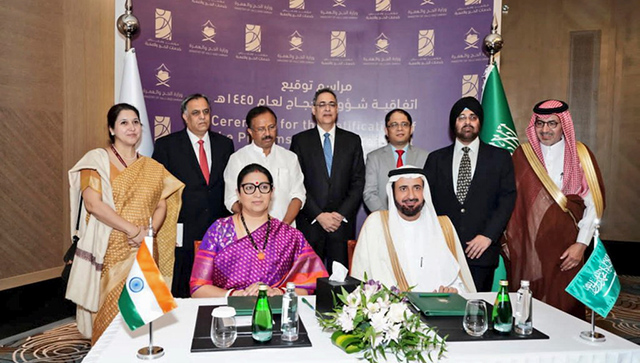Thanks to Bangladesh, India’s home ministry officials and state governments like Maharashtra have become aware of televangelist Zakir Naik preaching ultra-conservative version of Islam to millions. If home ministry officials across the country were to make only a little effort, they would realise that the radical version of Islam is being pedalled for years from different social media channels and Salafi mosques that have mushroomed across the country.
There are now animated discussions on Indian TV channels and print media about the “radical” effect of telepreachers like Naik. Banning PeaceTV will not solve the problem. The growing acceptance of the Salafi version of Islam among young Muslims has not happened overnight or only due to Zakir Naik, but many more who have set up Salafi mosques, educational institutions, media training institutes and TV channels where the dominant theme is: True Muslims follow only Quran and Sunnah, others are not Muslims.
The Salafi brand of Islam — one which considers all ideas and practices of Muslims that are not in conjunction with the Holy Book as heretical — has taken root across the continent, among a growing population of young Muslims who are being told day in and day out that they must return to their roots.
Salafis are more conservative and do not accept many of the beliefs of Sunni Muslims, and they are more aggressively opposed to any cultural influence impacting Muslim practices. They are greater opponents of mysticism, and reject ideas of saints and their shrines as unacceptable. This makes South Asian Islam as nothing short of heretical. Men and women must not mix with non-Muslims, give up any form of worship such as visits to Sufi shrines and abjure any act that could be construed as unIslamic.
The reach of Salafi preachers who consider Sufis, Shias, Qadianis and Ahmadiyahs as non-Muslims and oppose social integration of Muslims with non-Muslims like Hindus and Christians has attained proportions that are probably beyond the understanding of many in governments.
Today, Saudi Arabia-sponsored and supported Muslim clerics, mosques, educational and charitable institutions span the country, and new technological tools provided by social media have made it far easier for people to watch, hear and get indoctrinated.
Right under the nose of governments of J&K, Karnataka, Kerala, Maharashtra, Odisha and many more, Salafi mosques have come up. Their congregations have rapidly risen with younger Muslims patronising them in large numbers.
Kerala leads all states with the number of radical groups, Salafi mosques and such clerics growing over the years. They are also using social media successfully, given the state’s high literacy rate.
Over two months ago, the Imam of Holy Kabah in Makkah, Sheikh Muhammed bin Talib, on a visit to India inaugurated the launch of Peace Radio in Kerala. With over 12 hours of daily programming, the radio app can be downloaded on to mobile phones and people in Kerala can listen to varied programmes dealing with Quran and its teachings.
Such apps are beyond the realm of government control. Sermons, Q&As and talks on how to be a true Muslim are beamed to many more on handy mobile phones.
Or, if one wants to listen to respected Islamic orators, then one can log on to Dawa Voice and download Islamic speeches in Malayalam or questions and answers by favourite speakers.
Or, one can download Islamic speeches in Malayalam by logging on to www.islahvoice.com.
Log on to www.salafivoice.com and apart from learning the true teachings of Quran one can also check out the list of “deviant sects” in Kerala and probably steer clear of them. According to Salafi Voice, the list of deviant sects includes Sufis, Kerala Samstha, Thableeq Jamaath, Jamathe Islami and Chekannoor.
Switch on the internet and search YouTube and one will come across hundreds of recorded interviews and sermons of clerics and preachers who seek to get Muslims to follow “true Islam” by accepting Salafi Islam.
In one video, Zakir Naik says Hindu culture influenced the trend of going and praying at graves of Sufi saints. “My great great great grandfather was a Hindu. I am not Arabic. Those Hindu influences have continued…praying for the dead is allowed but not praying to dead at their graves…,” he tells his audience.
Naik and many other preachers focus on the need for a Muslim to be “true” to Quran and Sunnah. Their sermons or answers to queries from Muslim men and women stress on exclusivism and are against any integration with other religious groups.
If looking for internationally influential preachers then, they too, are easily reachable. US-born Anwar-ul-Alwaqi who was killed in 2011 in a US drone attack when on a visit to his home country, Yemen, spews venom against the Western world and stresses on exclusivism. Sample this: In one YouTube video, he tells Muslims that they should not be swayed in their judgement of non-Muslims by their “good neigbours” or “colleagues”.
The social media space is exploding with influential preachers who easily tap into the insecurity of young Muslims. More and more young people are taking shelter in religion and these easy-to-access preachers exploit their insecurities and urge them to adhere to the original teachings of Quran and not follow ‘deviant’ versions such as Sufism. Mobile apps and ready to digest sermons on social media have only made the challenge posed by radical Islamist preachers much more difficult for governments today to tackle.


)




)
)
)
)
)
)
)
)